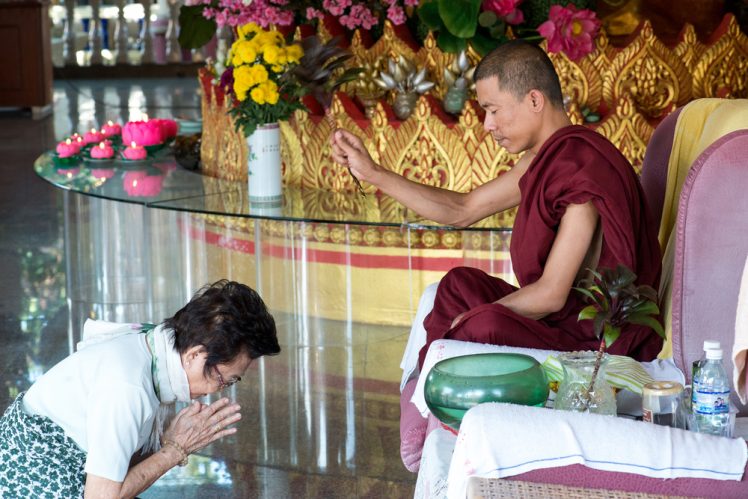English to BM Phrasebook – Part 6: Pronouns and honorifics

So you know how to ask a question in BM and you can tell time and order a decent meal at a mamak. But, you keep saying ‘I’ and ‘you’ in English because you’ve heard so many different possible pronouns and you’re confused. Well, I don’t blame you. Pronouns can be challenging in BM.
We’ll go through it one level at a time, starting with first person pronouns and make our way through to honorifics and the right terms to use when addressing royalty.
One important thing to note is that in Malaysia, respect is very important. When you’re speaking to someone older than you or of a higher authority, you can’t just use regular first person pronouns. Often times in cases like that, you’d used third person pronouns when talking to someone. It may seem odd in English, but in Malay, it’s considered a sign of respect.
So let’s begin.
First person
When referring to yourself in conversations, you can use aku or saya. Aku is informal and usually used when speaking to friends; while saya is more formal and is best used when speaking to strangers or elders, and can also be used in informal conversations.
In BM, there are two first person plurals (we). You can use kita if you’re including the person you’re talking to in the collective or kami when you’re not including your conversation partner.
| English | Bahasa Melayu |
|---|---|
| I (informal) | Aku |
| I (formal) | Saya |
| We (including the person you're talking to) | Kita |
| We (not including the person you're talking to) | Kami |
Example:
You: Hi Susan, sorry we’re late.
You: Hi Susan, minta maaf kami lewat.
In that situation, you’d use kami, because Susan didn’t arrive late with you.
You: We should buy a present for Azlan’s birthday next week.
You: Kita patut beli hadiah untuk hari lahir Azlan minggu depan.
Here, the right pronoun would be kita since you’re including Susan when you say ‘we’.
Second person
In BM, there are a few translations for the word ‘you’. The more formal version is anda, while engkau, awak, and kamu are all informal pronouns. BUT, you have to be mindful of when to use the different versions.
Engkau is mostly reserved for very close friends and shouldn’t be used when speaking to elders (may differ in different parts of Malaysia, but holds mostly true for the Klang Valley area). Using engkau when speaking to someone older than you, especially your family, can be considered very rude. The same goes for awak.
| English | Bahasa Malaysia |
|---|---|
| You (close friends only) | Engkau |
| You (informal - friends) | Awak |
| You (informal) | Kamu |
| You (formal) | Anda |
Personally, I feel that awak is a gentler pronoun and I’d use it when speaking to friends while engkau I reserve for really, really close friends. An informal option when speaking to new friends or strangers is kamu, which is both polite and warm.
Speaking with respect
Remember how respect plays a huge part in Malaysian culture? So here, let’s talk about how you would speak to elders. Using any of the pronouns above can be considered rude, so take a look at the words in the table and use these instead.
| English | Bahasa Melayu |
|---|---|
| Mr | Encik |
| Mrs | Puan |
| Miss | Cik |
| Uncle | Pak Cik |
| Aunty | Mak Cik |
| Little brother / sister | Adik |
| Older sister | Kakak or Kak |
| Older brother | Abang or Bang |
We covered this is a previous edition but we’ll go through it again. In Malaysia, we refer to older people as aunty or uncle, regardless if they’re related to you. For people who are not that much older than you, you can refer to them as older sister or brother, while those younger than you are little brother or sister. In formal situations, you can use Mr, Mrs, and Miss instead.
Also worth nothing is that you can use cik as a short form of pak cik and mak cik. Similarly, it’s considered polite to also refer to younger people as adik, meaning little brother or sister.
Example:
When speaking to older man (either family or stranger)
You: Hi, how are you?
You: Hi pak cik, apa khabar?
When speaking to younger person
You: You look adorable in that saree.
You: Adik nampak comel dalam sari itu.
Third person
Here, it’s quite simple. There are only three third person pronouns that you need to remember. In BM, there are no distinctions between men and women when it comes to pronouns, so he and she both translate to dia. Dia can be used in formal and informal conversations to refer to any regular person.
When referring to someone who is respected – including Datuks, professionals, as well as parents and teachers in formal situations like events – you should use beliau. It is a mark of respect. Also, the only third person plural you should remember is mereka (them) which works in all situations.
| English | Bahasa Malaysia |
|---|---|
| He / She | Dia |
| He / She (formal; a mark of respect) | Beliau |
| Them | Mereka |
Example A
Ali: I saw David today. He looked really sad.
Ali: Saya nampak David hari ini. Dia nampak sedih.
Deepak: I think he saw the news.
Deepak: Saya rasa dia tengok berita.
Example B
Susan: Let me introduce Mr Alan. He’s the keynote speaker today.
Susan: Benarkan saya memperkenalkan En Alan. Beliau adalah penceramah utama hari ini.
Honorifics
When speaking to someone who carries a title, you should refer to them in the third person at all times as a sign of respect, same as above.
Example:
When speaking to someone who carries the title of Datin
You: How are you?
You: Datin apa khabar? or Apa khabar, Datin?
You: Thank you for attending this event.
You: Terima kasih, Datin, kerana menghadiri acara ini.
Addressing royalty
When speaking to royal persons, there is a specific type of vocabulary that is necessary. This is called Bahasa Istana, or Palace Language. Bahasa Istana is reserved only when speaking to or about royalty. This dates back to when sultans ruled their individual states, and is still used now as a mark of respect.
| English | Bahasa Melayu Istana |
|---|---|
| I (used by non-royalty when speaking to royalty) | Patik |
| I (used by royalty when speaking to subjects) | Beta |
| You (when speakng to royalty) | Tuanku |
| He/She (when referring to royalty in third person) | Baginda |
Example A
When speaking to the agong or any member of the royal families
You: I’d like to thank you for the invitation, Your Majesty.
You: Patik ingin mengucapkan terima kasih atas jemputan Tuanku.
When royal persons are speaking to their subjects
King: I would like to wish all Malaysians a Selamat Hari Raya.
King: Beta ingin mengucapkan Selamat Hari Raya kepada semua warga Malaysia.
If you need any clarification, leave a comment down below and we’ll try out best to help you unravel the mysteries of BM. Check out the entire series of English to BM Phrasebooks here.
See also:
Follow us on Facebook or register for our weekly e-newsletter to keep updated.
"ExpatGo welcomes and encourages comments, input, and divergent opinions. However, we kindly request that you use suitable language in your comments, and refrain from any sort of personal attack, hate speech, or disparaging rhetoric. Comments not in line with this are subject to removal from the site. "



















